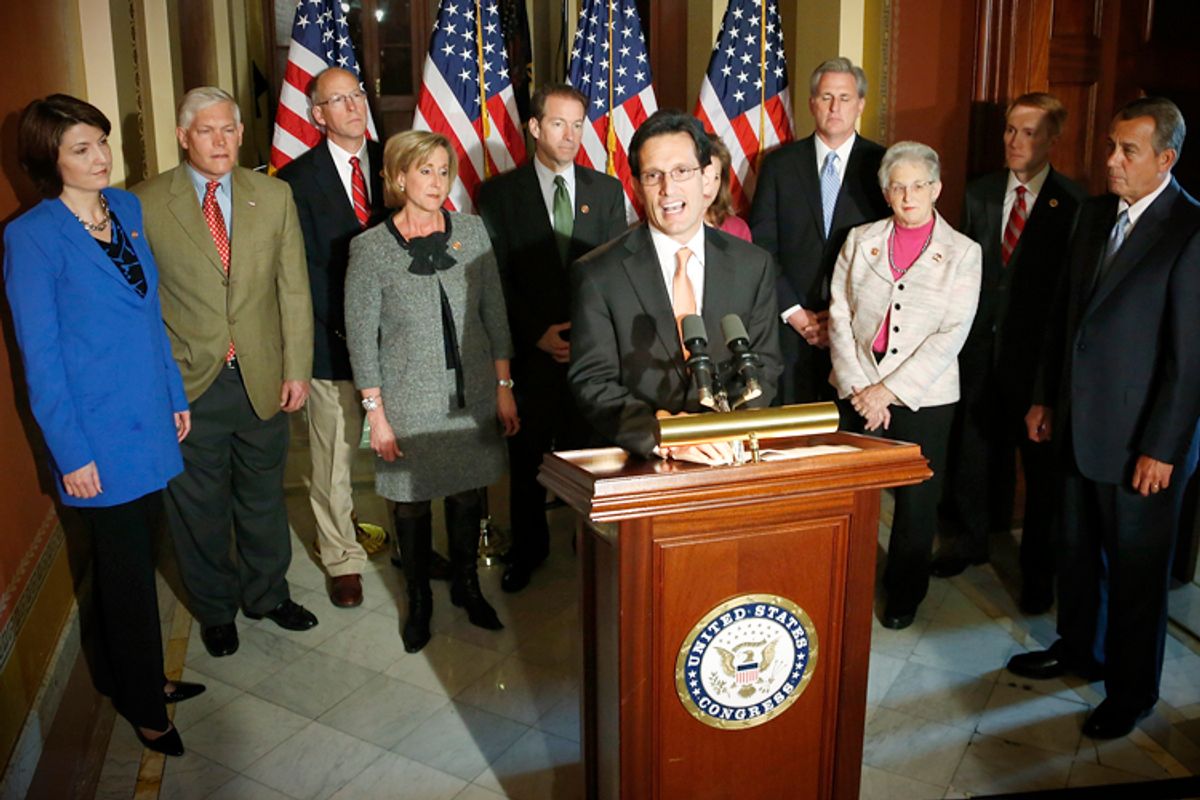A piece of Republican legislation you've probably never heard of (perhaps because it doesn't yet exist) is a strong contender to touch off the sleeper political fight of 2013.
Shortly after the August recess ends, Rep. Shelley Moore Capito, R-W.Va., will introduce the "No ObamaCare Subsidies for Congress Act," which would prohibit members (seemingly just members, not aides) from receiving a significant federal subsidy to buy insurance in state-based exchanges.
If you're just tuning in, here's the back story. In short, the Affordable Care Act requires members and many aides to relinquish their existing health benefits and instead, if they'd like, choose new "Obamacare" insurance. Under the administration's interpretation of the legislative text (and as initially intended by the senator who drafted the measure) members and aides will be able to bring the federal government's contribution toward their premiums with them, to offset their costs.
Capito's bill would prohibit members from claiming that benefit, leaving them to pay their premiums in full, out of pocket; find another source of insurance (spousal coverage, Medicare, etc.); or join the ranks of the uninsured. It would codify a pledge she and at least a couple of other members of Congress have already made (one of the two has already pledged to co-sponsor the bill).
Conceptually, it's a perfect expression of the modern conservative ethos -- an indelible combination of populist pandering and quasi-principled rhinectomy. It turns conservative confusion over Obamacare -- confusion Republicans have done as much as anyone to enable -- into the basis for a bill that will have the ancillary benefit of testing the sincerity of the GOP's anti-Obamacare hysteria.
But it's actually better than that. Right now, members of Congress get their subsidized insurance through the Federal Employee Health Benefits Plan. Starting Oct. 1, they'll begin enrolling in the exchanges, and then in January, whether they carry over their subsidy or not, the switch from FEHBP to ACA will be complete. There's growing pressure on Republican members to decline the subsidy and perhaps many of them will. Just by existing, the bill will increase that pressure.
But if Capito intends to eliminate the subsidy before anyone claims it, she will come into conflict with the 27th Amendment: "No law, varying the compensation for the services of the Senators and Representatives, shall take effect, until an election of Representatives shall have intervened."
Strictly speaking, the prohibition can't take effect until January 2015 (unless, perhaps, it takes the politically awkward step of rerouting the subsidy into a salary increase for all members). Capito's communications director didn't respond to an inquiry about the wording of the bill. But depending on how it's written, it will likely either ask members of Congress to relinquish a benefit many of them will have been enjoying for a full year, or else violate the same Constitution to which anti-Obamacare absolutists claim unique fidelity.
Either way, it will pit Republicans against both Democrats and each other. To take just one example, Capito is running for Senate in West Virginia and is married to a Wells Fargo financial adviser who presumably can add his spouse to his employer-provided insurance. Sponsoring this bill helps her politically without jeopardizing her health or finances. By contrast, her colleague Rep. Sean Duffy, R-Wis., has six children and, in his most recent financial disclosure form, declared that neither he nor his spouse earned more than $200 in income beyond his $174,000 annual salary. This might actually be a really big deal for him.
Still, bills along these lines tend to pass. It's too politically toxic for members to vote in their own financial interests, even in a case like this where they'd simply be voting to maintain their current compensation. Opponents won't construe it that way. They'd construe it as a vote to protect a special Obamacare kickback. The attack ads write themselves. So do the talking points for the bill.
"Regular Americans, non-members of Congress who are forced to go to the exchanges because their employers have dropped the insurance, are not eligible for subsidies," Capito told Fox News earlier this month. "Members of Congress should not be eligible for subsidies."
As punitive and unnecessary as Capito's plan and the underlying Obamacare provision that gave rise to it are, there's a partial logic here.
Capito is wrong to say that regular Americans whose employers nudge them into the exchanges will be ineligible for subsidies. That'll only be true for those who earn more than 400 percent of the federal poverty level -- a small minority of the small minority whose employers will decline to offer affordable insurance in the first place. But $174,000 is a lot more than 400 percent of the federal poverty level. On that level she's identified a real disparity between how members of Congress and a small number of high-income earners in the country will be treated.
But many of those workers will reclaim some or all of their lost benefits in the form of higher wages and salaries. If Capito writes her bill to convert member health benefits into higher salaries -- to make the Sean Duffys of Congress whole -- her stand against Obamacare will be an equitable one. But I'm not holding my breath.



Shares